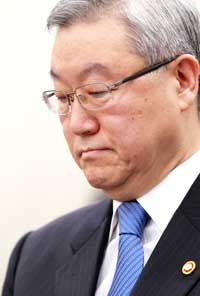Lawmakers express concern over Korea-Japan military pact

Kim Sung-hwan, Minister of Foreign Affairs and Trade, lowers his head during a parliamentary committee meeting, Wednesday. (Photo : Yonhap)
Bipartisan lawmakers of the parliamentary foreign affairs committee Wednesday expressed concern over the intelligence-protection agreement with Tokyo.
Some of them urged the need to sign an equivalent military pact with China, the nation’s biggest trading partner, to sweep away the allegation that the Korea-Japan pact aims to counter Beijing’s military expansion in the region, while some called for the pact to be scrapped.
The National Assembly’s Foreign Affairs, Trade and Unification Committee’s plenary session Wednesday attended by foreign minister Kim Sung-hwan met to review the controversial agreement on protecting classified military information, generally known as the General Security of Military Information Act (GSOMIA), with Tokyo.
Seoul pulled back from the pact on June 29 because of bipartisan opposition and rising anti-Japanese sentiment.
The government was also criticized for approving the pact in an impromptu manner during the June 26 Cabinet meeting without giving any notice to the public.
However, President Lee Myung-bak and ministry officials plan to push ahead with the agreement after undergoing questioning at the National Assembly arguing that the pact will help gather information on North Korea’s missile launches and nuclear tests.
The foreign minister will attend another round of the committee session on Friday.
“Due to the procedural flaw, the agreement itself has been misunderstood at home and abroad,” said Rep. Shim Yoon-joe, a former diplomat and a member of the ruling Saenuri Party. “Since we have already suggested that China sign the GSOMIA with us, it is necessary to simultaneously process the signing of the pact with both Japan and China.”
Beijing earlier expressed concern over the envisioned Korea-Japan military agreement saying, “Countries should make careful moves so that they can help bring peace and stability to the region.”
Seoul has been in low key talks over signing the GSOMIA with Beijing amid ongoing talks between Seoul and Tokyo. Kim, during the session, said Seoul earlier suggested that Beijing should sign the GSOMIA toward the end of June.
“One of the biggest losses to our diplomacy after pushing for the Korea-Japan intelligence pact is that it unnecessarily provoked China,” said Rep. Kim Sung-gon, a member of the main opposition Democratic United Party (DUP). “It made it hard for us to acquire information from China.”
Committee members of the DUP, including Rep. Kim, spoke with a single voice to scrap the pact referring to Korean citizens who are not satisfied in having a military pact with the former colonial ruler.
Asked about whether Washington was behind the push for a Korea-Japan military pact, Kim answered, “the United States government never asked us to do so.”
Observers say the Korea-Japan intelligence-protection agreement is unlikely, at least under the Lee Myung-bak administration, because both parties opposed the pact in the lead up to the presidential election in Dec. 19.
Meanwhile, the Saenuri and DUP lawmakers also went on to criticize procedural flaws of processing the pact but differed on how the foreign minister should bear the responsibility of this happening.
The DUP called for the immediate resignation of the foreign minister while the ruling party called for more investigation into the case. <The Korea Times/Chung Min-uck>





















































